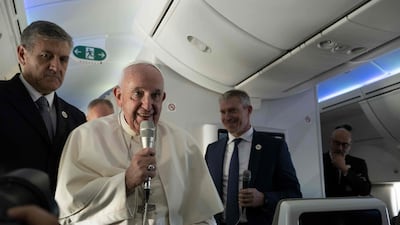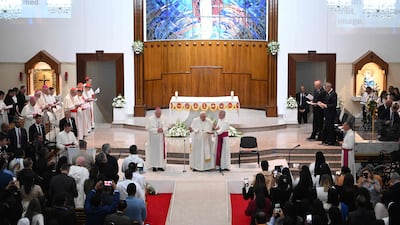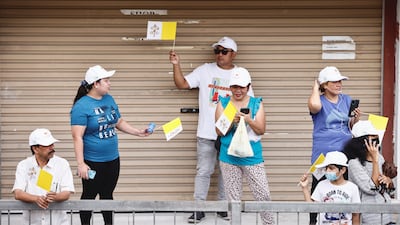Pope Francis has given a fascinating insight into the making of the historic Document of Human Fraternity that was signed in Abu Dhabi on his first visit to the Gulf.
It all started when he broke bread with Dr Ahmed Al Tayeb, the Grand Imam of Al Azhar, who was visiting the Vatican, the Pope revealed on Sunday.
The Pope was speaking aboard a papal flight from Bahrain to Rome at the end of a packed four-day schedule to the Gulf nation.
“He had come to the Vatican for a visit," Pope Francis said. "It was almost lunchtime and he was leaving, and as I was accompanying him to bid him goodbye I asked him: ‘Where are you going for lunch?’”.
They decided to dine together.
“Then, sitting at table, we took the bread, broke it, and gave it to each other. A gesture of friendship, offering the bread,” he said.
They then decided to write a paper about the meeting.
“So the Abu Dhabi document was born" after several drafts were exchanged, the Pope said.
Divine force
Egypt’s highest authority on Sunni Islam, Dr Al Tayeb co-signed the document with the Pope in Abu Dhabi in February 2019.
The document paves a path for greater harmony and understanding between all faiths.
It also inspired a UN-recognised International Day of Fraternity, which has been held since last year.
The Pope, 85, believes divine force guided him and the Grand Imam to formulate the paper.
“It was something that came from God. You can't understand it otherwise, because none of us had this in mind. It emerged during a friendly lunch and that is a big thing,” he said.
“I believe that one cannot think of such a path without thinking of a special blessing from the Lord in this path.
“It seems right that you know how the Lord inspired this path.”
The Pope said his encyclical Fratelli Tutti, or Brothers All, released in 2020 was also based on the Human Fraternity manuscript.
The encyclical is an extended letter of papal teachings intended to guide the faithful.
Dr Al Tayeb and the Pope are now bound by the same mission to promote peace across the world.
“What I wrote about human friendship in Fratelli Tutti is based on the Abu Dhabi document,” he said.
“I didn't even know what the Great Imam's name was, and then we became friends and did something as two friends, and now we talk every time we meet.
“The document is relevant today and work is being done to make it known.”
Bahrain ‘visit of encounters’
The Pope sees hope in interfaith relations after the Bahrain visit.
He met senior Muslim leaders, religious heads, scholars, young people and local Catholic parishioners.
“It was a visit of encounters because the purpose was really to be in interfaith dialogue with Islam and in ecumenical dialogue,” he said.
“The key word is dialogue.”
He said he took note of Dr Al Tayeb's ideas during the Bahrain meetings.
“I listened carefully to the speeches of the Grand Imam and I was struck by the way he was so insistent on intra-Islamic dialogue, not to erase the differences but to understand each other and to work together, not to be against each other,” the Pope said.
The Pope also met the Muslim Council of Elders in Bahrain.
He stressed the need to keep co-operation alive.
“We have to walk together as believers, as friends, as brothers and sisters, doing good,” he said.
The Pope said Cardinal Pietro Parolin, the Vatican secretary of state, and the Grand Imam of Al Azhar were travelling from Bahrain to Cairo in the same plane.
They are travelling “together as brothers", he said.
“This is something that is quite moving.”
Lebanon is suffering
The Pope also appealed to Lebanon’s politicians to put the country back on track after an economic collapse that has left families struggling.
“Lebanon is a sorrow for me,” he said. “Lebanon right now is suffering.
"I pray and I take this opportunity to make an appeal to Lebanese politicians: leave aside self-interest, look at the country and be in agreement.
“Right now I don't want to say ‘Save Lebanon’ because we are not saviours, but please, you have to support Lebanon, help so Lebanon stops this descent, so Lebanon regains its greatness.”
Willingness to listen
Earlier aboard the plane, Vatican's foreign minister, Archbishop Paul Gallagher, told The National that the Pope’s visit confirmed Bahrain had a tradition of tolerance and acceptance of religions and ethnicities.
The country is home to the Gulf’s first Roman Catholic church built in 1939 in Manama, and the largest one, Our Lady of Arabia Cathedral that opened in the desert town Awali last year.
“I think what surprised me is there seemed to be a willingness to listen to the Pope’s message,” Archbishop Gallagher said.
“I thought there might be sensitivities but people were listening to him and that was good.”














